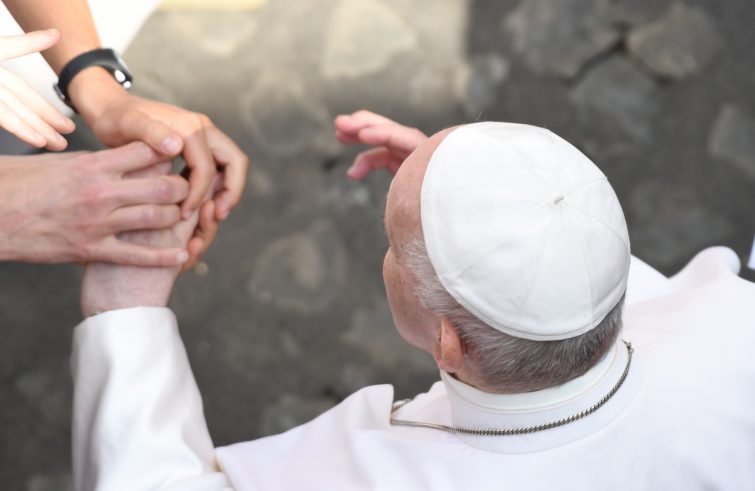
“I hope that with this itinerary of prayer we have succeeded in praying a little better, praying a little more”, the Pope said in unscripted remarks with regard to the “long itinerary dedicated to prayer”, concluded with last Wednesday’s general audience. The Holy Father thus began a new cycle of catechesis dedicated to Saint Paul’s Letter to the Galatians. “This letter is very topical. It seems to be written for our times”, Francis pointed out from the Courtyard of San Damaso. It indicates that “the path of evangelisation does not always depend on our will and plans, but requires a willingness to allow ourselves to be shaped and to follow other paths that were not foreseen”, Francis said.
“Paul, when he arrived in a city, in a region, did not construct a great cathedral immediately, no. He created small communities that are the leaven of our Christian culture today.”
“It is an ancient practice to present oneself at times as the sole possessor of the truth, the pure, and to aim at belittling the work of others, even with slander”, is the other topical feature drawn from Paul’s Letter. After founding these Churches, Paul “became aware of a great danger to their growth in faith”: “The vultures come to wreak havoc in the community”, Francis said in unscripted remarks. “Indeed, some Christians who had come from Judaism had infiltrated these churches, and began to sow theories contrary to the Apostle’s teaching, even going so far as to denigrate him”, the Pope explained: “They began with doctrine and then they denigrated the Apostle. It is the usual method: undermining the authority of the Apostle.” In fact, these opponents of Paul “argued that even the Gentiles had to be circumcised and live according to the rules of the Mosaic Law. They went back to the previous observances, those that had been superseded by the Gospel.” The Galatians, therefore, “would have had to renounce their cultural identity in order to submit to the norms, prescriptions and customs typical of the Jews. Not only that, those adversaries argued that Paul was not a true apostle and therefore had no authority to preach the Gospel.” “We see this very often”, Francis added:
“Let us think about how in come Christian communities or dioceses, first they begin with stories, and then they end by discrediting the priest or the bishop. It is precisely the way of the evil one, of these people who divide, who do not know how to build.”
For the Pope,
“today too there is no shortage of preachers who, especially through the new means of communication, can disturb communities.”
“They present themselves not primarily to announce the Gospel of God who loves man in Jesus, Crucified and Risen, but to insist, as true ‘keepers of the truth’ – so they call themselves – on the best way to be Christians.” Francis outlined their identikit: “hey strongly affirm that the true Christianity is the one they adhere to, often identified with certain forms of the past, and that the solution to the crises of today is to go back so as not to lose the genuineness of the faith.” “Today too, as then, there is a temptation to close oneself up in some of the certainties acquired in past traditions”, the Pope said, and asked:
“How can we recognise these people? One of the traces of this way of proceeding is inflexibility.”
For the Galatians, Francis explained, “having come to know Jesus and believe in the work of salvation accomplished by His death and resurrection, was truly the beginning of a new life, a life of freedom. They had embarked on a path that allowed them to be free at last, despite the fact that their history was interwoven with many forms of violent slavery, not least that which had subjected them to the emperor of Rome. Having come to know Jesus and believe in the work of salvation accomplished by His death and resurrection, was truly the beginning of a new life, a life of freedom. They had embarked on a path that allowed them to be free at last, despite the fact that their history was interwoven with many forms of violent slavery, not least that which had subjected them to the emperor of Rome. Therefore, faced with criticism from the new preachers, they felt lost and they felt uncertain about how to behave. In short, there was a lot at stake!
This situation is not far removed from the experience of many Christians today.” “Following the teaching of the Apostle Paul in his Letter to the Galatians will help us to understand which path to follow”, the Pope assured: “The path indicated by the Apostle is the liberating and ever-new path of Jesus, Crucified and Risen; it is the path of proclamation, which is achieved through humility and fraternity – the new preachers do not know what humility is, what fraternity is. It is the path of meek and obedient trust – the new preachers know neither meekness nor obedience.” The Holy Spirit works in the Church in every age.” “Ultimately – Francis concluded – faith in the Holy Spirit present in the Church carries us forward and will save us.”










